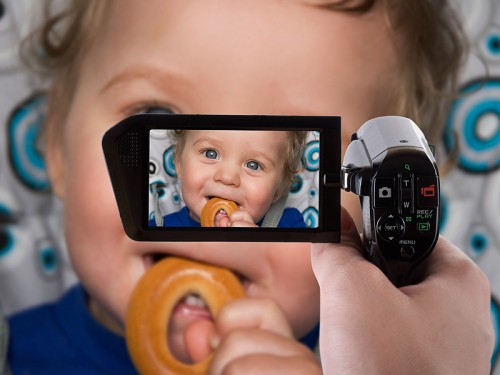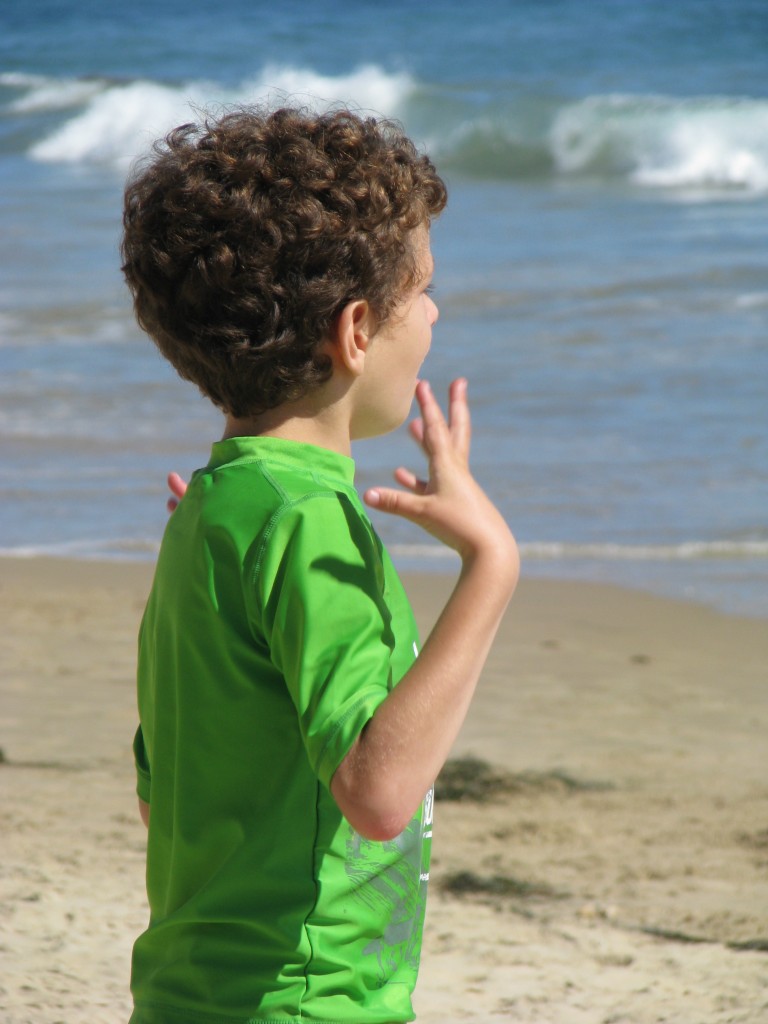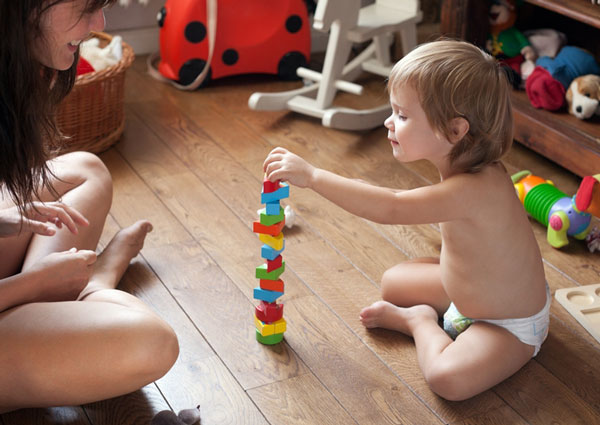Infant Repetitive Behaviors and Autism
New research has provided a bit more validation and credibility to the Developmental Milestone questions we’re asking at all the “Well Baby Checks” we’ve been doing.
We already seem to have a bit of a handle on the risk factors for Autism Spectrum Disorder (ASD); but, we would really like to be able to feel comfortable with the ability of the questions we ask to accurately predict, with a modicum of certainty, which infants might benefit from closer watching and possible intervention – without needlessly worrying parents to the point of self-fulfilling prophecy.
Home video useful in Autism screeningIf any other family member has been diagnosed with ASD, that would a high-risk indicator that an additional child born to the family might also have ASD. Some studies show that there would be a 1 in 5 chance.
The early symptoms are very, VERY subtle and even the best of clinicians with lots of experience are still unable to make an accurate diagnosis before 18 months of age. Even if they could, there MIGHT not be any difference if they did – beyond what a normal good parent SHOULD do.
EXCEPT that at least one small, limited study seemed to show that “interventions” starting as early at 18 months improved IQ a little as well as language ability and social interaction; so, our modus operandii is: to figure out how to do things earlier and better.
That’s what this post is about.
Early Predictors of Autism
Researchers at the University of North Carolina in Chapel Hill presented their analyses of data in Atlanta at the 13th Annual International Meeting for Autism Research. They believe that they understand some subtle behaviors of infants a bit better now and that – in retrospect – children being diagnosed with ASD at 2 years of age showed a bit higher level of some otherwise “normal infant behaviors” than did children not diagnosed with ASD.
I deliberately wrote that last sentence in that back-handed way because, in medicine and honest statistics, there is a big difference between retrospective observations and being able to predict outcomes from prospective observations. Often a huge one.
Let’s take a pithy example. We do a big study and show that 90% of 2 year olds being diagnosed as Autistic suck their thumbs. Would it be right to go out and scrutinize every child for thumb-sucking, telling mothers that their 1-year-old was autistic? Even if you only said “might become autistic.” Absolutely NOT! It would be obviously and completely unwarranted.
Repetitive Behaviors as Predictors of Autism
So, let’s keep that in mind as I describe the study of 184 toddlers who were “at high risk for ASD” [like having a sibling with the problem], and 59 “low risk [control]” infants being followed for two years, logging all kinds of behavior indicators and finally whether they were diagnosed with ADS by 2 years of age.
Parents of these study infants were asked to document the presence of different types of repetitive behaviors seen in autistic children at 12 and 24 months of age. Things like hand and arm flapping, self-injurious behaviors, compulsive behaviors (things done in certain order), ritualistic behaviors (eating only certain colored foods, toys lined up) and restrictive behavior (limited interests).
Back to the disclaimers – all of these behaviors are seen in NORMAL children with normal development. The questions become: how many and how much and are there any other confounding variables.
The Chapel Hill group found that infants with 3 or more types of repetitive behavior at 12 months of age were 4 times more likely to meet diagnostic criteria for ASD at age 2 years compared with low-risk infants and high-risk infants who were not diagnosed with ASD at 2 years of age. So, there seems to be increased numbers of behaviors.
Additionally, infants who were diagnosed with ASD at 24 months not only had higher levels of motor movements at 12 months but had higher levels of self-injurious behavior, higher levels of insistence on sameness, and higher levels of a requirement to engage in complex routines. So, there seems to be increased amounts and severity of certain behaviors.
In that sample of children, those diagnosed with autism averaged 4-8 repetitive behaviors while those that weren’t had only 1-2 types of repetitive behaviors; and those behaviors seemed to clearly increase as opposed to remain at the same levels or diminish. But remember, that study was only looking at pre-identified high-risk infants for autism. (I.e. ‘normal’ infants without risk could be completely different.)
Diagnosing Autism Difficult
Toddlers all have repetitive behaviors. That’s how they navigate and learn about their world. They learn habits and gain understanding of everything through repetitive testing and experimentation. That’s normal development.
It seems we’re understanding more now that, after careful observation over a period of time, a certain sub-group of children can be identified who repeat things for repetition’s sake (or can’t adequately close off learning) and that those behaviors interfere and make the child less adept at engaging in social interaction.
Diagnosing ASD, even for an experienced clinician, is extremely difficult. Recognizing a repetitive behavior (as I’ve already said) is fairly easy, it’s deciding whether it is typical or atypical that becomes the hang-up. If it were easy, we’d simply say that every child who wanted to watch the same movie over and over, or every child who jumped up and down flapping their hands when excited, should be checked for autism.
That is just simply not the case.
Is There A ‘Too Early’ to Diagnose Autism?
If you ask absolutely anyone who is interested in helping children with autism they will universally tell you that the hope is: “if we can do a good job of identifying and screening those children who exhibit a high-risk level of repetitive behavior early on and get that child outside of their locked patterns of behavior, we may be able to improve outcomes.”
We do NOT know if identifying ASD earlier than 18 months makes a difference, we hope it does. And if it does, what do you do different? (Other than what we would expect at good parenting). There may be something. Do you rely on sameness to reduce stress? Or, do you flood with wide ranging and varied experiences so that ‘social interaction’ becomes the new norm? Maybe in the middle.
The one thing that can be said is that if the diagnosis is true: the more people in the child’s life actually engaged in helping, the better the outcome overall throughout life. Most parents of a child who is autistic these days have approached their pediatrician with their concerns by about 18 months. They may not know specifics but they feel that “something is different.” And with nearly ubiquitous availability of video recording devices, much better communication with physicians is possible.
Here are some of the questions which a pediatrician will be asking you at the various Well Baby Checks to help diagnose several developmental issues, including autism.
| Predictive Early Signs | Age: 9 Months | Age: 12 Months | Age: 15 Months |
|---|---|---|---|
| Eye contact | 1. Does your child look you in the eye for more than a second or two? 2. Does your child smile or laugh while looking at you? |
Ask again at 12 months | Ask again at 15 months |
| Response to name | Does your child react when spoken to, for instance, by looking, listening, smiling, or babbling? | When you call your child’s name, does he/she respond by looking or turning toward you? | Ask again at 15 months |
| Interest in others | Does your child like playing games with others such as peek-a-boo, ride on someone’s knee, or to be swung? | Does your child take an interest in other children? | Ask again at 15 months |
| Spontaneous showing | N/A | Does your child ever pick up objects and give them to you? | Does your child show objects to you without giving you the object? |
| Joint attention | 1. Does your child look at things you are looking at? 2. When you look at an object across the room, does your child look at it? |
1. Does your child ever use his/her index finger to point to ask for something? 2. If you point to an object across the room, does your child look at it? |
1. Does your child ever use his or her index finger to indicate interest in something? 2. If you point to an object across the room, does your child look at it? |
Full formal screening for ASD is not recommended until 18 months of age, but selected, developmentally appropriate activities, such as eye contact, response to name calling, interest in others, spontaneous showing, joint attention, and lack of stereotypical behaviors, can be assessed during infancy.
[http://www.firstsigns.org/downloads/m-chat.pdf – Modified Checklist for Autism in Toddlers]
[http://firstwords.fsu.edu/pdf/checklist.pdf – Infant toddler checklist]
Advertisement by Google
(sorry, only few pages have ads)



